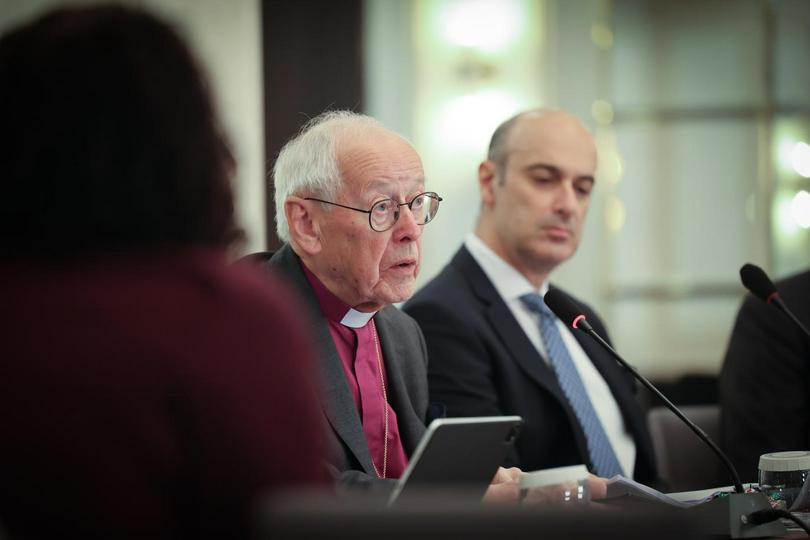As a "Life and Work" centenary conference in Athens entered its second day, the World Council of Churches (WCC) Commission of the Churches on International Affairs traveled back in time to consider the scene in Stockholm in 1925—then took a courageous look forward at the many serious global issues under consideration by churches today.
Keynote speaker Bishop Dr Jonas Jonson, bishop emeritus of the diocese of Strängnäs in the Church of Sweden, set the tone with a vivid description of the original Life and Work conference.
"The royal family, ambassadors in diplomatic uniform, ministers of government, and ordinary parishioners found their seats while thousands of spectators crowded the streets to get a glimpse of the remarkable event," he said.
Eighty accredited journalists and photographers covered every aspect of the meeting.
"What makes us still remember what happened in Stockholm one hundred years ago?" he asked.
Europe had seen empires tumble, he noted. "The First World War had been a primal catastrophe fundamentally changing the world geopolitically, socially, and spiritually," he said. "A ruthless war between Christian nations had forever changed human history."
Delegates had a mandate to speak for their churches and thus make them involved in the ecumenical movement.
"The committed participation of Orthodox bishops was of particular significance," he said. "Without them, the conference would have been nothing but yet another sectarian Protestant event."
For the key visionary of the Stockholm conference, Archbishop of Uppsala Nathan Söderblom, churches were all different, but this was no obstacle for practical cooperation.
"In his understanding, the churches were already one in the Spirit inasmuch as they were grounded in Jesus Christ," said Jonson. "Unity did not need to be created so much as recognized."
Participants remembered the friendly, creative, and deeply spiritual atmosphere at Stockholm, and the Christian fellowship prevailing all through the conference, transcending bitter denominational and national antagonisms.
"Life and Work moved Christian ethics from a matter of individual concern to that of communal responsibility," said Jonson. "In doing so, it challenged both unrestrained capitalism and socialist disdain for individual rights."
Looking at the Stockholm conference and its context today, similarities with our own time are evident, said Jonson. "The delegates to Stockholm faced the realities of their time and responded, some of them in a truly prophetic manner," he said. "Without illusions, they sought to protect a fragile peace by supporting still immature institutions like the Court of Justice and the League of Nations."
Twenty-three years later, in 1948, the World Council of Churches, merging Faith and Order and Life and Work, was constituted at the 1st WCC Assembly in Amsterdam.
"Within the present structures of the World Council of Churches, the Commission of the Churches on International Affairs remains an essential heritage of Stockholm 1925," Jonson said. "Strong and binding multilateral structures are indispensable in the world of today."
He also underscored that the obligation of the WCC Commission of the Churches on International Affairs remains to strengthen such structures and to promote international law.
"The time for God's peace is now," he concluded.
But achieving such a peace calls into question the strength and even the very definition of "international law" today, said Dr Miltiadis Sarigiannidis, associate professor of international law at the Aristotle University of Thessaloniki, in a response to the keynote address.
"International law is the subject of daily reference and interpretation by a wide variety of users," he said. "International law must be distinguished from ethics, which, while reasonably fueling into the value content of international law, is a branch of philosophy."
He also noted that diplomatic resolution is a particular form of dispute resolution in the international environment, which cannot be assigned to national legal orders. "On the contrary, vigilante justice and acts of retaliation are usually prohibited and are the exception in national legal orders, since judicial resolution and peaceful settlement prevail," said Sarigiannidis.
He acknowledged that the question of compliance with the rules and principles of international law is a classic area of criticism. "This is where the absence of a central authority equipped with effective coercive powers, as is the case in domestic legal orders, becomes more pronounced," he said. "Similarly, the decisive and enduring role of states becomes apparent, especially when they choose to ignore international law."
Originally from the World Council of Churches
CCD reprinted with permission












